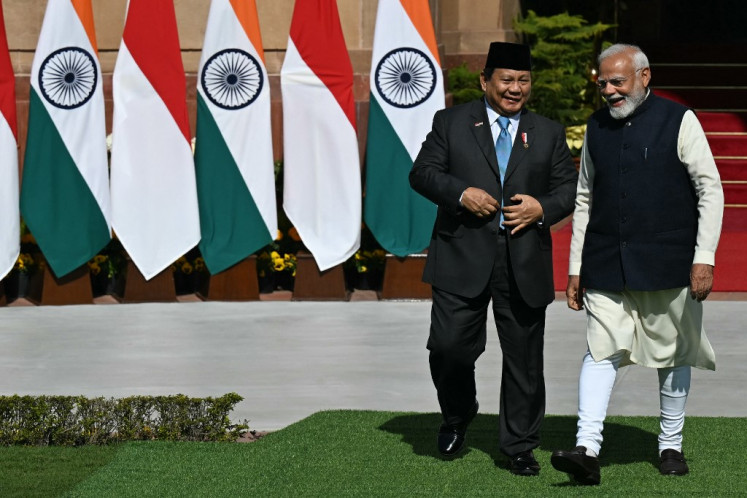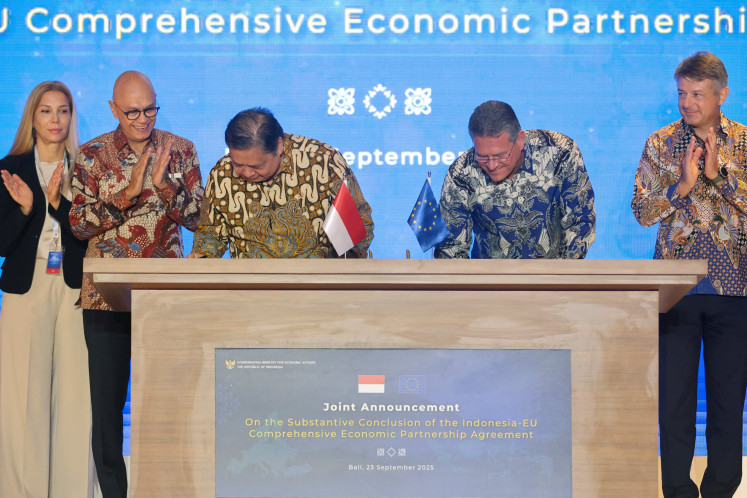Popular Reads
Top Results
Can't find what you're looking for?
View all search resultsPopular Reads
Top Results
Can't find what you're looking for?
View all search resultsElections 101: Organizational wisdom and anticorruption
Change text size
Gift Premium Articles
to Anyone
O
ne hundred and one regions in Indonesia will hold local elections in 2017. With over 13,000 islands, many observers view direct elections in Indonesia as a huge undertaking despite the benefits of being able to put politicians of people’s choosing in office.
In relation to the decentralized system in Indonesia, direct elections are expected to promote growth and development in regions by ensuring that those who run for local government are those who can serve their people best.
After the fall of the New Order regime in 1998, direct elections are seen as a foundation for sustaining electoral democracy as well as promoting political integrity, democratic accountability and good governance in Indonesia.
However, the seemingly more robust apparatus of decentralized government is viewed by many scholars as not reflecting the robustness in its quality. In terms of state resource management, for example, corruption has always been on the top of the list of problems threatening the pillars of democracy.
Considering the numerous cases of corruption involving heads of regions in the past, it is of no surprise that many still doubt next year’s direct local elections will be better than the previous ones in producing leaders that are capable and have integrity.
For example, according to a study by the Corruption Eradication Commission (KPK) on the potential conflicts of interest in the 2015 local elections, campaign donations are often associated with expectations for the competing candidates to return the favor if they are elected to office. Of the respondents (losing candidates), 56.3 percent believed that when it comes to campaign donations there is no such thing as a “free lunch”.
The majority (75.8 percent) of the respondents also believed that had they won the elections they would return the favor to their donors. The study also revealed that easing business licensing processes, participation in government procurement projects and access to positions at local government offices as well as local government owned enterprise (BUMD) are believed to be the most common expectations from campaign donors.
A leader in an organization holds an important role in determining its performance and character. Through the process of knowledge conversion in which knowledge in both tacit and explicit forms are created and disseminated he or she will shape the organization into either an accountable or a corrupt entity.
A leader’s tacit knowledge such as values, norms, and morality will materialize into explicit knowledge such as business strategy, company policy, product design, to name a few, which will then be internalized into organization members’ behavior. These include not only good organizational practices but also fraudulent behavior.
In Indonesia, many newly elected heads of regions are left with irreversible legacies of fraudulent behavior in their institutions. Some of these leaders chose to play along and became part of the existing deviant organizational culture while some others opted to stand up for what was right and tried to make a difference.
A recent study by the Centre for Strategic and International Studies (CSIS) revealed that the majority of its respondents (66.4 percent) believed that in the past two years corruption has been on the rise in Indonesia.
Half of the respondents (50.7 percent) argued that the weak deterrence effects of law enforcement on corruption offences is a major cause of the rise.
In other words, all the hard work of putting offenders behind bars does not seem to stop corruption from regenerating over time. A major reason corruption remains pervasive in the public sector despite the numerous prosecutions of public officials is the fact that it already becomes part of the knowledge conversion process in many public institutions.
This enables corruption to regenerate over time regardless of the existing anticorruption measures.
Referring to the differential association theory, the knowledge of financial crime such as corruption is created, developed and disseminated through the learning process within an organization supported by its environment (e.g. culture and leadership style).
The first step in removing the knowledge of corruption from local governments in Indonesia is the appointment of local leaders with accountability and integrity through elections. For this the public need to be educated on the characteristics of good leaders so as to enable them to vote wisely.
Once elected into office a leader who wishes to make a difference in his or her new office needs to first understand how people interact in his institution as well as how knowledge conversion is carried out within it to identify behavioral problems, especially related to potential corrupt acts.
When parts of organizational tacit and explicit knowledge with the potential to cause corrupt acts are identified the next step is to execute systematic organizational unlearning to “forget” them by means of removing them and replacing them with the new knowledge (also known as “re-learning”) of accountability and integrity.
In most cases carrying out systematic unlearning and re-learning requires herculean efforts and only a handful of local leaders in Indonesia are known to have been successful in doing so. This is so as although removing explicit knowledge may be done by means such as changing standard operating procedures, work manuals, company policies and other official documents, due to its intangible nature, changing tacit knowledge requires (much) more personal interactions such as through followership and apprenticeship.
The crucial part in carrying out organizational unlearning and re-learning is shifting organization members’ subjective cost — benefit consideration regarding the old and the new knowledge.
A leader must be able to make his or her followers realize that in the long run the “net-benefits” (benefits minus costs) of the new knowledge of accountability and integrity will outweigh those of the old knowledge of corruption and misconducts.
Measures such as increasing the severity of sanctions for misconducts and increasing the incentives of good performance and accountability are examples of efforts to shift the cost-benefit consideration.
The real challenge here is to find the right mix of measures as every organization member has its own behavioral or personal characteristics by which he or she is recognizable as a member of a group.
A leader needs to be sensitive enough to “sense” how subordinates value things in their personal and organizational life so as to enable him or her to decide the best approach to change attitudes toward corrupt acts.
___________________________________
The writer is the director of the Center for Forensic Accounting Studies at the Islamic University of Indonesia in Yogyakarta. He is also a lecturer at the postgraduate program school of Economics at the same institution.










